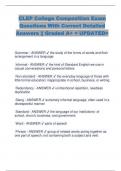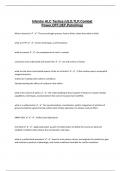CLEP College Composition Exam
Questions With Correct Detailed
Answers || Graded A+ < UPDATED>
Grammar - ANSWER ✔ the study of the forms of words and their
arrangement in a language
Informal - ANSWER ✔ the kind of Standard English we use in
casual conversations and personal letters
Non-standard - ANSWER ✔ the everyday language of those with
little formal education; inappropriate in school, business, or writing
Redundancy - ANSWER ✔ unintentional repetition, needless
duplication
Slang - ANSWER ✔ extremely informal language; often used in a
disrespectful manner
Standard - ANSWER ✔ the language of our institutions- of
school, church, business, and government
Word - ANSWER ✔ parts of speech
Phrase - ANSWER ✔ group of related words acting together as
one part of speech; not containing both a subject and verb
, Clause - ANSWER ✔ group of related words containing a subject
and a verb
Sentence - ANSWER ✔ group of words containing a subject and
a verb and expressing a complete thought
Paragraph - ANSWER ✔ group of sentences organized around a
central or main idea
Verb - ANSWER ✔ a word that expresses action or helps to
make a statement
Subject - ANSWER ✔ a word or words naming person, place,
thing, or idea about which something is being said
Compound Subject/Compound Verb - ANSWER ✔ Two or more
subjects or verbs connected by and or or
Direct Object - ANSWER ✔ A noun or pronoun that answers the
question whom or what after an action verb. It receives the action
of the verb.
Subject Complement/Predicate Nominative - ANSWER ✔ A noun
or pronoun (or adjective) which follows a be or linking verb and
renames or describes the subject. (Think of a be or linking verb as
an = sign)
Nomative Pronoun - ANSWER ✔ used as subject or subject
complement (I, you, he, she, it, we, they, who, whoever)
Objective Pronoun - ANSWER ✔ used as an object of verb or of
preposition (me, you, him, her, it, us, them, whom, whomever)
, Possessive Pronoun - ANSWER ✔ shows ownership (my, mine,
you, yours, his, her, hers, its, our, ours, their, theirs, whose,
whosoever)
Pronoun Rule #1 - ANSWER ✔ Anyone, everyone, someone,
everybody, somebody, anybody, and nobody are singular. The
singular pronoun his is used with them
Pronoun Rule #2 - ANSWER ✔ Avoid double subjects and
useless pronouns
Pronoun Rule #3 - ANSWER ✔ when a pronoun modifies a
gerund (a verbal noun), it is used as an adjective and is in the
possessive case.
Pronoun Rule #4 - ANSWER ✔ Never use hisself or theirself, use
himself or themselves
The principal parts of a Verb - ANSWER ✔ 1) the present tense
(I break)
2) the past tense (I broke)
3) the past participle (I have broken). This form is used with a
helping verb.
Verb Rule #1 - ANSWER ✔ of is not a substitute for have
Verb Rule #2 - ANSWER ✔ ought is not preceded by have or
had
Verb Rule #3 - ANSWER ✔ would or should forms of the verb
are not used in if clauses
, Verb Rule #4 - ANSWER ✔ use the present subjunctive form in
an if clause of a statement that is obviously not true. This is called
a condition contrary to fact. The verb most frequently involved is
to be. The present of to be in the subjunctive is were.
Infinitive - ANSWER ✔ usually proceeded by to: it is used as a
noun, adjective or adverb. It can never be the main verb of the
sentence.
Participle - ANSWER ✔ used as an adjective. The present
participle ends in ing. Past participles have several endings (ed,
d, t, n, en)
Gerund - ANSWER ✔ The ing form used as a noun
Adjectives and Adverbs - ANSWER ✔ have three degrees of
comparison: positive, comparative, and superlative
Adjective and Adverb Rule #1 - ANSWER ✔ After linking verbs
such as look, seem, appear, taste, smell, feel, sound, use
adjectives to describe the subject
Adjective and Adverb Rule #2 - ANSWER ✔ Really is an adverb;
real is an adjective. Do not use real to modify another adjective
Adjective and Adverb Rule #3 - ANSWER ✔ Adjectives do not
modify verbs
Adjective and Adverb Rule #4 - ANSWER ✔ Good is never an
adverb





